Law firm content marketing can flip the dynamic for your practice. Instead of chasing leads, your firm becomes the apparent choice when potential clients start searching online.
If your office calendar is lighter than expected, don’t worry; it rarely reflects your legal skills. The real issue? Visibility.
Today’s clients aren’t browsing directories; they’re turning to Google, scanning reviews, and forming opinions long before you ever speak to them.
According to Birdeye’s State of Online Reviews 2025, 80% of all legal firm reviews are on Google. At the same time, most people won’t look beyond the first page of search results.
That means if your firm isn’t producing relevant, search-optimized content, you’re not part of their consideration set.
While some attorneys rely solely on referrals, others are landing top-tier cases simply by showing up with the right content at the right time and place.
That’s the power of a focused law firm content marketing strategy: sustained visibility, earned trust, and a steady pipeline of qualified leads.
In this blog, you’ll learn how to build a content engine that draws attention, communicates your expertise clearly, and ranks where it matters most.
It’s time to stop waiting and start being found.
Table of contents
- What is legal content marketing?
- Benefits of content marketing
- What is a content marketing strategy for law firms?
- 20 content marketing tactics every law firm needs (2025)
- Where does Birdeye fit into your multi-location law firm’s content strategy?
- Law firm case Study: How Birdeye turned Hupy and Abraham’s reputation into real results
- FAQs on law firm content marketing
- Final thoughts: Start building trust with your words
What is legal content marketing?
Legal content marketing strategically creates and distributes valuable, informative content to attract, engage, and convert your law firm’s target audience.
Unlike direct advertising, this approach focuses on educating prospective clients, building trust, and demonstrating your firm’s expertise long before a consultation is booked.
At its core, legal content marketing is about answering the questions your intended audience is already asking online.
Whether you explain legal recourse after an accident, outline tenant rights, or offer safety tips for workplace incidents, you aim to provide clarity and confidence through valuable information.
Some common content formats for law firm
- Practice area pages optimized with relevant keywords.
- Client testimonials and case studies that showcase real outcomes.
- Educational content like how-to guides, blog posts, eBooks, templates, and legal checklists.
- Social media posts that highlight legal insights or timely issues.
- Detailed posts that dive deep into specific laws, processes, or case types.
- Frequently asked questions (FAQs) to address common client concerns.
- Infographics to break down complex legal subjects.
- Video content explaining legal concepts, introducing your team, etc.
- Webinars, podcasts, news and press releases that offer your expert take on recent legislation or industry trends.
- Email newsletters that keep clients and contacts engaged with updates and insights.
When law firm content is paired with search engine optimization (SEO) and a clearly defined audience, this content does more than educate; it:
- Drives organic traffic.
- Improves search engine rankings.
- Positions your firm as a trustworthy authority in your niche.
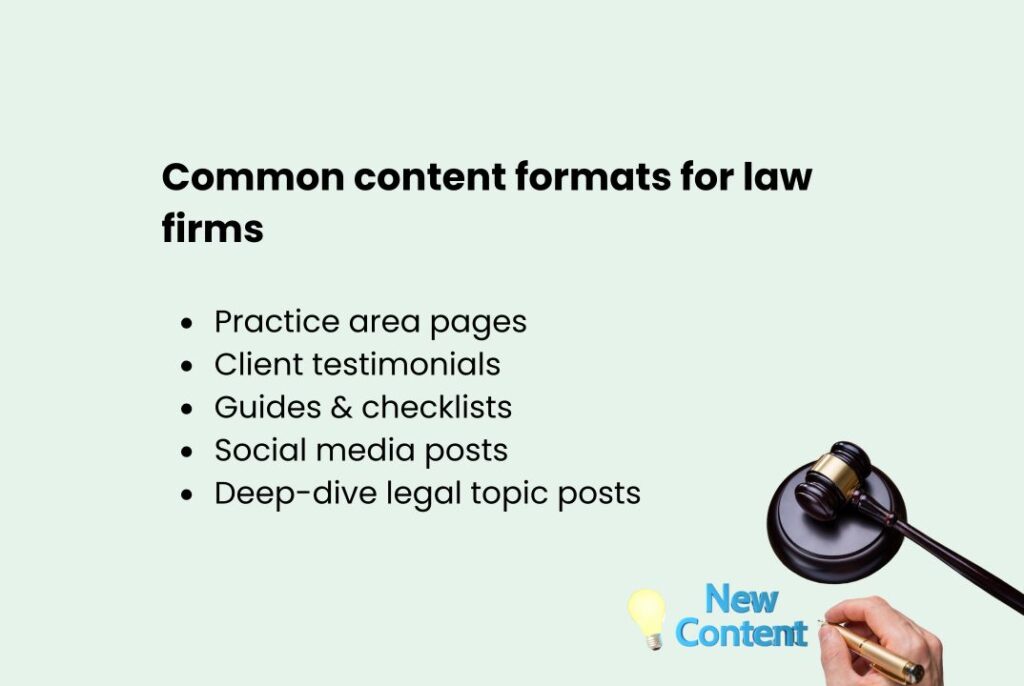
For multi-location law firms, content marketing is especially impactful. It allows you to build visibility without overspending on ads, while competing with larger firms that dominate directories and paid placements.
Benefits of content marketing
When done right, content marketing for law firms can transform passive readers into engaged prospects and prospects into paying clients. Yet, many firms underestimate how powerful a consistent, high-quality content strategy can be.
Here’s what strategic content marketing unlocks for your law firm:
- Higher search visibility: Regular publishing of SEO-optimized blog posts and detailed posts positions your firm on Google’s first page, where most legal searches begin and end.
- Educated prospects: Clear, helpful content that breaks down complex legal processes, outlines legal recourse options, or shares actionable safety tips builds trust before a consultation is even booked.
- Qualified leads: Content that aligns with search intent naturally attracts clients actively looking for your services, resulting in higher conversion rates.
- Credibility and differentiation: Thoughtful content helps your firm stand out in saturated practice areas by showcasing your unique voice and legal expertise.
- Sustained engagement: Consistent content, from blog posts and newsletters to social media and webinars, keeps your firm top-of-mind throughout the client decision cycle.
For multi-location law firms with limited marketing budgets, content marketing remains one of the most cost-effective strategies in digital marketing.
Unlike ads that disappear once the budget runs dry, your best-performing content keeps working in the background, bringing in traffic, building authority, and attracting clients over time.
Content marketing drives growth that law firm needs
Relying on legal directories, billboards, or referrals alone leaves you vulnerable to being outpaced by more visible competitors.
In today’s digital-first legal environment, trust is earned well before the first call, and content plays a central role in building it.
From practice area breakdowns and engaging content to client testimonials and explainer videos, your content educates your intended audience and positions you as the clear choice for their legal needs.
A potential client reading your article on “What to do after a workplace accident” isn’t just learning; they’re also evaluating whether your firm can guide them.
And yes, lawyers are allowed to advertise, provided they follow ethical and regulatory guidelines. Content marketing is one of the most transparent, moral, and relationship-focused ways to build a law firm marketing presence that resonates.
Whether you share safety tips for tenants, provide legal advice after a personal injury, or publish detailed posts that clarify legal rights, your content can become a trusted resource and your firm the trusted solution.
In a nutshell, content marketing for attorneys plays a vital role in helping firms attract, educate, and convert potential clients through valuable, search-optimized content.
What is a content marketing strategy for law firms?
A content digital marketing strategy for law firms is the foundation for consistent, purposeful marketing success.
It outlines how your firm will create relevant, high-quality content to reach ideal clients, showcase your legal expertise, and drive profitable client action over time.
While most law firms recognize the importance of blogging or social media marketing, few have a strategic plan aligning their messaging with measurable outcomes.
That’s where a content strategy comes in; it brings structure, clarity, and accountability to your law firm’s marketing efforts.
A strong content marketing strategy is defined as:
- Who your content is for: Clear audience personas based on demographics, legal needs, and behavior
- What type of content to produce: From explainer blogs on trending legal topics to client success stories
- Where to publish: our law firm website, LinkedIn, YouTube, newsletters, and more
- When to publish: Consistent scheduling guided by a well-mapped content calendar
- Why each piece exists: Every asset should serve a business goal (traffic, lead gen, authority, etc.)
To be effective, your strategy should include:
- A keyword-backed editorial calendar targeting high-intent search results.
- A balanced mix of compelling content.
- A cross-platform distribution plan including social media platforms, email, and third-party legal sites.
- KPIs tied to business growth: website traffic, rankings, consultations booked, and client engagement.
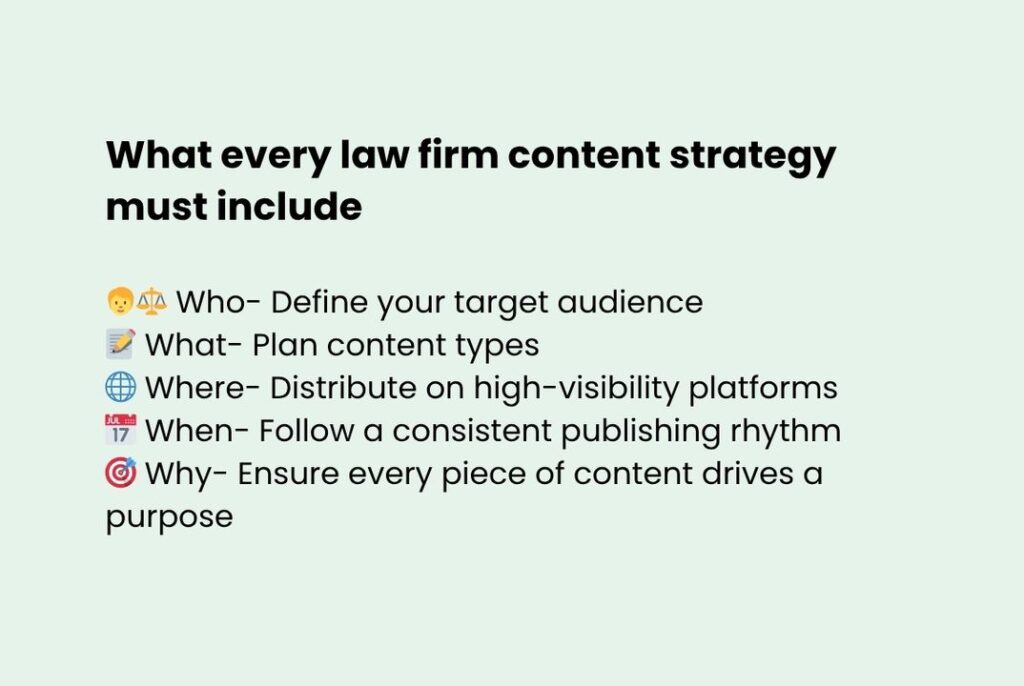
Ultimately, a legal content strategy ensures that every blog, video, or social post contributes directly to your law firm’s marketing efforts, building visibility, trust, and authority in a crowded legal industry.
20 content marketing tactics every law firm needs (2025)
Effective marketing for law firms requires more than just publishing the occasional article.
It demands a thoughtful, systematic approach that speaks directly to your target audience, positions your firm as a trusted authority, and drives measurable business results.
Here are 13 essential tactics for elevating your law firm marketing and creating valuable content that drives real engagement, search rankings, and revenue.
1. Set clear goals and KPIs
Start by defining what success looks like for your firm. Do you want to:
- Drive more consultation bookings?
- Increase organic traffic to your law firm’s website.
- Rank for specific practice areas in your city?
Tie each goal to a key performance indicator (KPI), such as time on page, call-to-action (CTA) clicks, or lead conversions. Use Google Analytics and third-party SEO tools to track these metrics and evaluate content performance over time.
2. Know your audience’s legal pain points
Effective marketing for law firms starts with understanding who you’re writing for. Identify your prospective clients’ demographics, pain points, and decision-making triggers to build detailed buyer personas.
Ask:
- What legal situations are they navigating?
- What confuses or worries them?
- What outcome are they hoping for?
Use surveys, CRM insights, and real client interviews to generate content ideas that speak directly to their needs, building trust before they even contact you.
3. Conduct deep keyword research
Strategic keyword targeting helps your content surface in high-intent search results. Use platforms like SEMrush, Ahrefs, or Birdeye Insights AI solutions to find relevant keywords your audience is actively searching.
Look for long-tail keywords that show clear legal intent (e.g., “how to contest a will in Florida” or “legal recourse after a car accident”).
Distribute those keywords naturally throughout your articles, headers, and URLs without keyword stuffing. Every piece of content should have a clear SEO purpose to gain online visibility.
Lead the legal industry with content marketing.
Want to see the impact of Birdeye on your business? Watch the Free Demo Now.
4. Choose the right content formats for your goals
Different goals call for different content types. Build a mix in your law firm marketing plan which serves both awareness and conversion:
- Blog posts: Ideal for SEO (search engine optimization) and answering common legal questions
- Practice area pages: Tailored for bottom-funnel prospects seeking specific legal services
- Client testimonials: Offer social proof to hesitant prospects
- Short videos: Break down complex legal processes and boost engagement
- FAQs: Capture zero-click traffic and featured snippets
- Downloadable guides: Great for lead generation and email list building
Diversifying your formats ensures you reach your target audience no matter where they are in their decision-making process.
5. Build and stick to a content calendar
Consistency builds credibility. A structured content calendar helps you plan and publish content in alignment with:
- Seasonality (e.g., tax season or divorce filings post-holidays)
- Marketing campaigns (like a new service launch)
- Legal industry trends or case wins
Your calendar should detail publish dates, formats, distribution channels, and responsible team members, making your law firm marketing efforts more efficient and scalable.
6. Optimize your law firm website for SEO
Your law firm website is your content’s home base. Make sure it follows SEO best practices:
- Fast loading speeds
- Mobile responsiveness
- Clear internal linking structures
- Optimized meta tags and headers
- Keyword-rich page titles and URLs
- Structured data/schema markup
Your practice area and blog pages should form the backbone of your SEO strategy, designed to convert traffic into consultations.
7. Distribute content across high-impact channels
Creating great content isn’t enough; you need to get it in front of the right eyes. Use newsletters, LinkedIn, YouTube, Facebook, and even local legal directories to share your content regularly.
Platforms like Birdeye with solutions like Birdeye Social AI make this easy by allowing you to schedule and publish social media posts across multiple platforms from a single dashboard, saving time and ensuring consistency.

8. Repurpose your best-performing content
Maximize ROI by transforming high-performing content into new formats:
- Turn a blog into a video explainer
- Convert a guide into a webinar or live Q&A
- Break down a long post into a series of carousel posts or infographics
- Turn testimonials into social proof ads
Repurposing reinforces your message across multiple touchpoints and helps you reach new audiences without starting from scratch.
9. Turn client reviews into valuable content
Social proof matters, especially in the legal industry, where trust is everything. Highlight client testimonials across your site and include them in blog posts or case study pages.
Birdeye helps you automate this process, collecting reviews, showcasing them strategically, and using positive feedback as content that builds confidence.
Patterson Law Group used Birdeye to gain 18,000 more website visitors and over 200 new reviews. They could achieve it simply by automating their review requests.
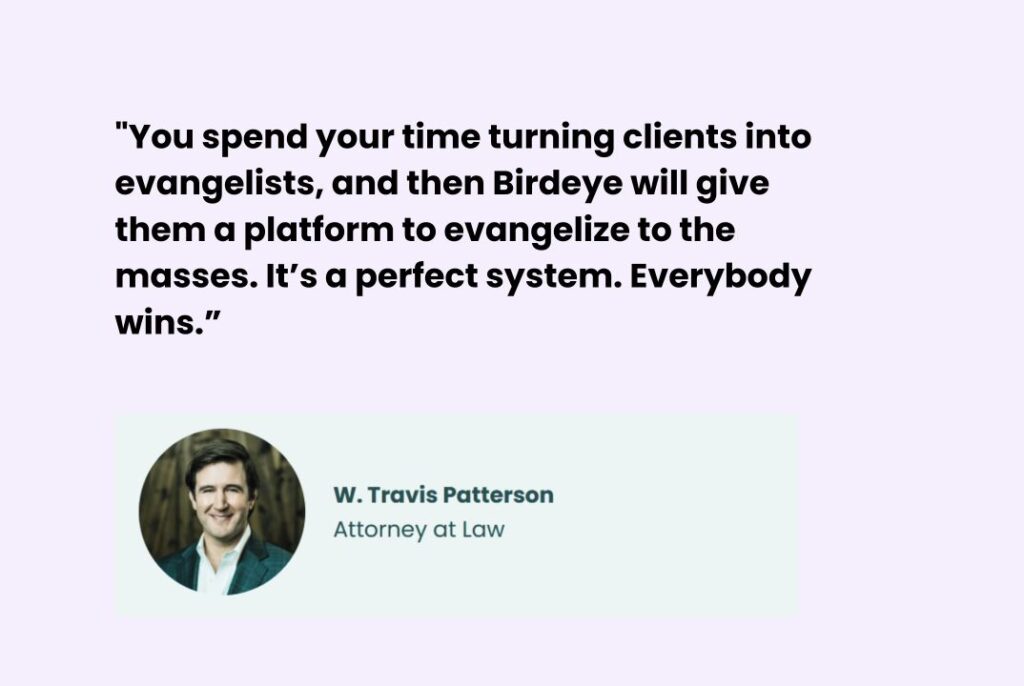
10. Measure performance and optimize continuously
Track KPIs like bounce rate, session duration, form fills, and click-through rates to understand how your content is performing. Use insights from Birdeye’s analytics tools or Google Data Studio to fine-tune your approach.
Focus on what’s working, prune what’s not, and iterate with intent. This data-driven mindset ensures your law firm’s marketing efforts align with your business goals.
11. Prioritize quality over quantity
Publishing dozens of thin posts won’t move the needle. Instead, focus on creating valuable, high-quality pieces that:
- Solve specific client problems
- Reflect on your firm’s unique voice and perspective
- Showcase your legal knowledge without overwhelming readers with legal jargon
Protip: One piece of compelling content that ranks and converts is worth more than ten filler articles.
12. Lean on expert support when needed
If your team lacks the time, resources, or expertise to execute a complete content strategy, consider partnering with a law firm marketing agency or using platforms like Birdeye. They can assist with everything from content planning and writing to distribution, SEO, and analytics, giving you more time to focus on your cases.
13. Extend your authority beyond digital
Content marketing doesn’t end with your blog. Build your reputation offline by:
- Speaking at local or national legal conferences.
- Publishing articles in legal journals or contributing to mainstream media.
- Volunteering with nonprofits or hosting pro bono clinics.
- Writing a book or eGuide on trending legal topics.
- Becoming a guest on legal podcasts or academic panels.
These activities elevate your brand and generate new content opportunities (e.g., event recaps, video interviews, speaker reels) to enhance your digital presence.
14 . Analyze your competitors with AI-powered insights
Stay ahead by understanding how your firm stacks up. Use Birdeye Competitors AI to identify top competitors by industry and location automatically, no manual research needed. Benchmark your firm’s Birdeye Score, review sentiment and online presence against theirs to uncover gaps, spot opportunities, and refine your strategy with precision.
15. Thought leadership through strategic content
Position your firm as an expert by publishing insights on recent case law, regulatory changes, or trending legal debates. Use your blog, LinkedIn, or webinars to build credibility and repurpose those discussions into articles, videos, and social media posts.
16. Snippet-ready formatting for SEO
Structure your content to win Google’s featured snippets. Use bullet points, numbered lists, and short, direct answers to common legal questions. This can improve visibility dramatically, especially for blog posts and FAQ pages addressing urgent legal concerns.
17. Build high-authority backlinks
Get quoted in legal publications, contribute to bar association blogs, or pitch guest posts to niche legal directories. These backlinks strengthen your domain authority, increasing your law firm website’s rankings and establishing off-site credibility.
18. Use AI to unlock content trends
Use AI solutions like Birdeye Review AI. It analyzes feedback, reviews, and surveys to detect emerging themes and client concerns. This gives you a strategic edge, helping you publish compelling content faster by knowing exactly what your audience cares about and what’s trending.
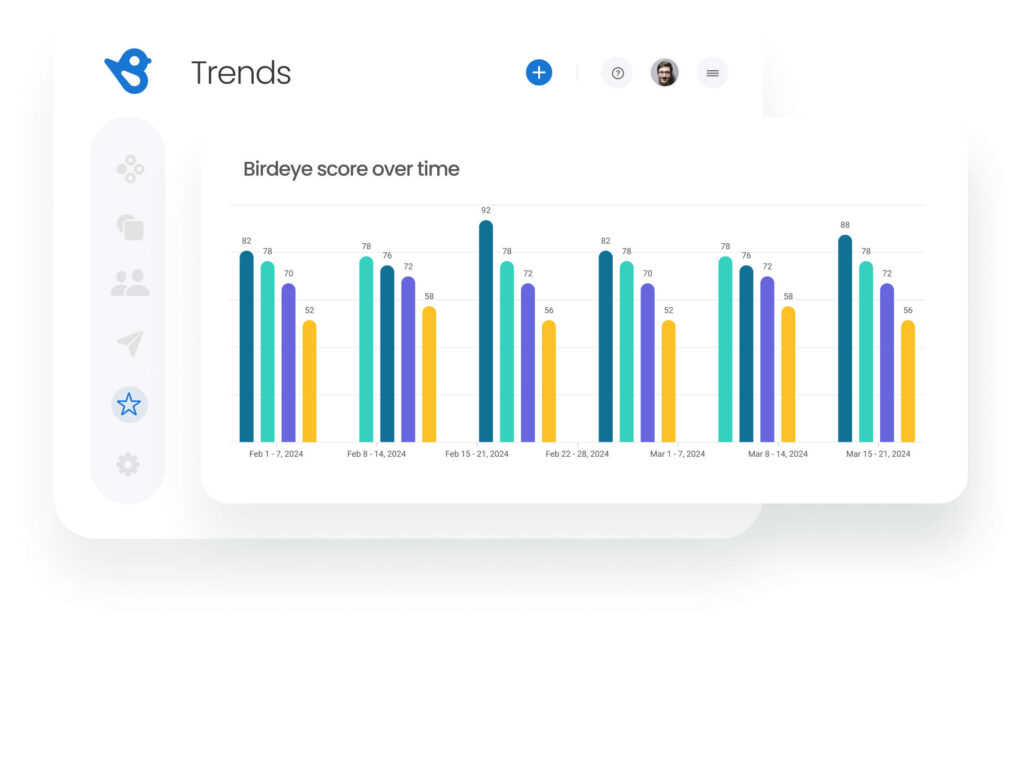
19. Optimize your contact forms for conversion
Ensure that every page, from blogs to service pages, makes reaching out to potential clients easy. Keep forms short, mobile-friendly, and strategically placed.
Bonus: Add a clear incentive (like a free consult or downloadable resource) to encourage submissions.
20. Create hyperlocal, practice-specific pages
Don’t just target “family lawyer.” Create unique, optimized pages like “Divorce Attorney in Charlotte NC” or “Estate Planning Lawyer for Business Owners.” These local, specific pages help you dominate long-tail search and serve clients in niche segments.
Where does Birdeye fit into your multi-location law firm’s content strategy?
Technology matters while executing a powerful, efficient, and measurable law firm content marketing strategy. That’s where Birdeye stands out.
As a leading platform for reputation management, social media publishing, and customer experience, Birdeye empowers multi-location law firms to scale their marketing efforts while saving time and increasing impact.
Here’s how Birdeye enhances every stage of your content marketing lifecycle:
1. Automate review collection and showcase trust
Positive client experiences are your most persuasive form of content. Birdeye automates the review request process and collects feedback across platforms like Google, Avvo, and Facebook.
As mentioned before, 80% of legal reviews are now happening on Google, and showcasing recent and relevant reviews can dramatically influence prospective clients.
Birdeye lets you spotlight these reviews on your law firm website, within blog posts, and across social channels, amplifying credibility where it counts.
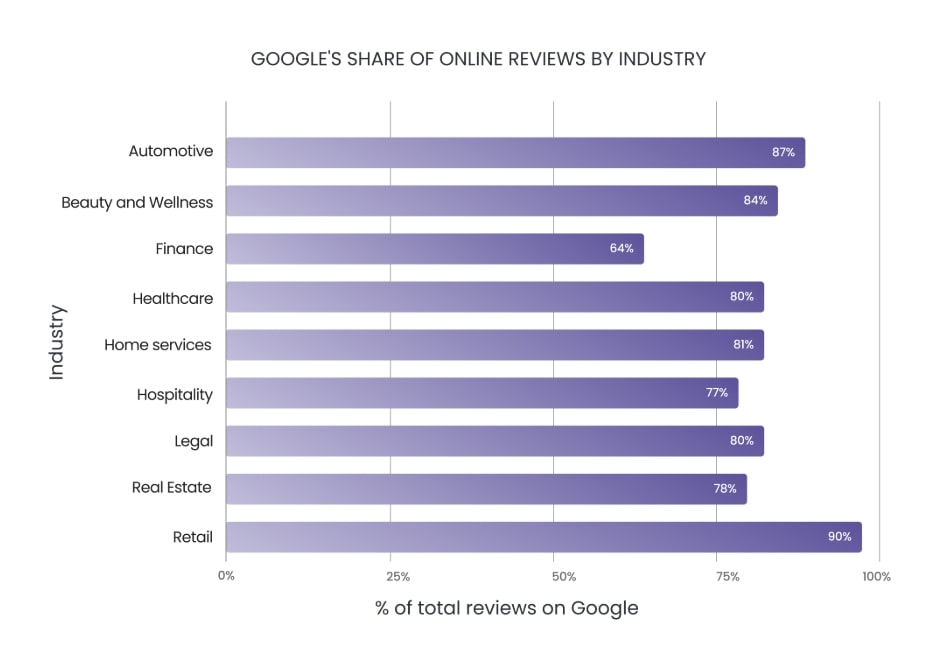
2. Streamline social media publishing
Consistency is key to visibility. With Birdeye Social AI, you can schedule, publish, and manage posts across all major social media platforms from a single dashboard. Whether you’re sharing client testimonials or legal updates, Birdeye helps maintain a steady drumbeat of valuable content without eating up your billable hours.
3. Discover content ideas through client insights
Not sure what to write about? Use Birdeye Reviews AI’s built-in survey tools to capture client feedback. Their responses highlight what matters most, revealing real questions, pain points, and concerns that can be turned into high-performing content ideas. This helps you create relevant, high-converting content that resonates with your target audience.
4. Boost local SEO with accurate directory listings
Birdeye ensures your law firm’s information, name, address, phone number, and practice areas are accurate and consistent across 80+ online directories. This strengthens your local SEO signals, helping you appear higher in search results for key legal services in your area.
5. Track performance with data-rich dashboards
What gets measured gets improved. Birdeye’s analytics give you clear visibility into how your content performs across channels. Monitor traffic, engagement, click-through rates, and review response times, all from one place, so you can confidently refine your law firm’s marketing efforts.
6. Never miss a moment to engage
Birdeye Social AI’s real-time alerts let your team respond to client reviews or inquiries the moment they occur. This boosts client engagement and opens up content opportunities, turning common questions or feedback into your next blog post or video.

Now, let’s look at the case study of the law firm Hupy and Abraham. Here’s what happens when a top law firm puts Birdeye’s solution to work.
Law firm case Study: How Birdeye turned Hupy and Abraham’s reputation into real results
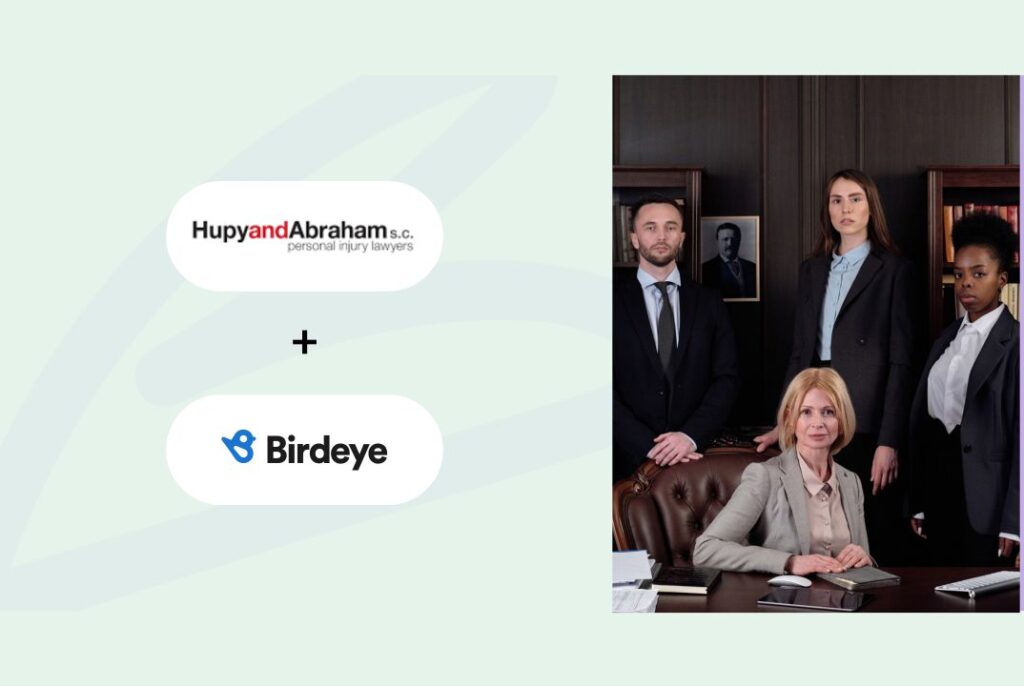
The Brand
Hupy and Abraham is a leading personal injury law firm known for its client-focused service and regional authority.
The Challenge
Despite its stellar reputation, the firm struggled to keep up with manual review collection and lacked a scalable process to turn feedback into impactful marketing content. Their existing efforts weren’t yielding the search engine rankings or visibility they needed to grow.
The Result
By implementing Birdeye, Hupy and Abraham automated their review and survey process, significantly improving response rates.
They began leveraging client feedback as testimonial content across their website and social media. With Birdeye’s automation and analytics, the firm boosted its Google rankings and streamlined operations, freeing valuable time and enhancing marketing outcomes.
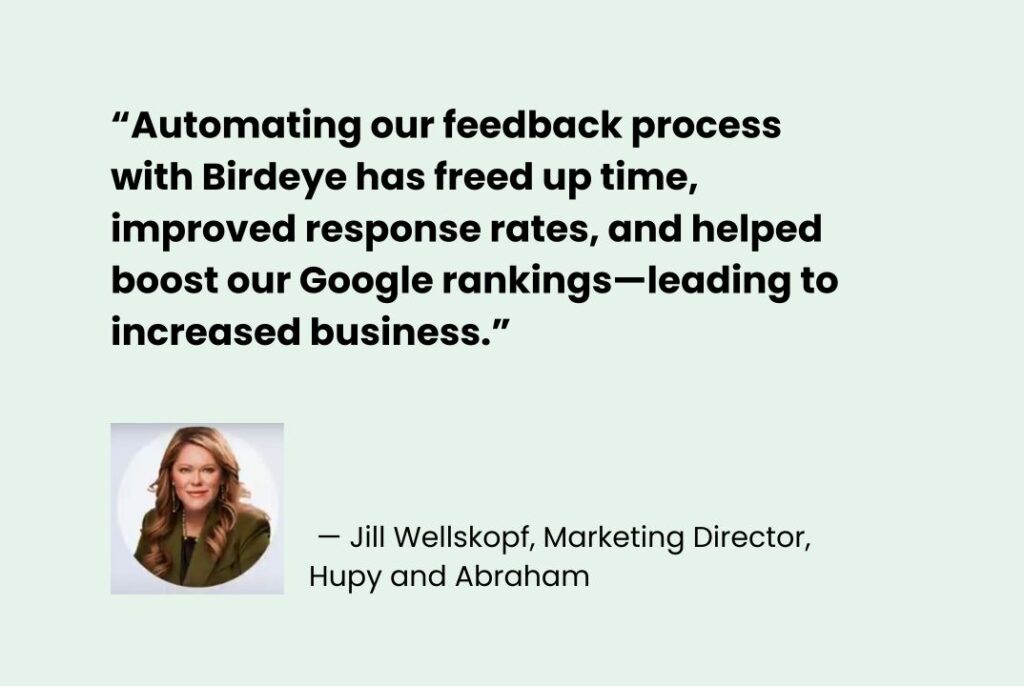
FAQs on law firm content marketing
Law firm content marketing involves creating and distributing valuable content (blogs, videos, FAQs, etc.) that builds trust and attracts potential clients to your legal services.
It increases search engine visibility, educates prospective clients, and builds credibility before they contact your firm.
Blog posts, client testimonials, practice area pages, and social media posts that explain legal topics simply and clearly work best for small law firm content marketing.
Start with 2–4 monthly posts and increase frequency as your content marketing efforts mature. Consistency matters more than volume.
Yes, tools like Birdeye use AI to gather insights, automate review responses, and help with content scheduling and performance tracking, making content creation more efficient and strategic.
Final thoughts: Start building trust with your words
Content isn’t fluff; it’s your most powerful client magnet. A strong law firm marketing content strategy drives organic traffic, builds credibility, and turns interest into consultations.
With the right tools like Birdeye, you can simplify execution, analyze impact, and scale your law firm content marketing without burning out your team.
Ready to build a robust content strategy that fuels real growth? Start with Birdeye and turn content into your best-performing marketing channel. Watch a demo now.

Originally published









